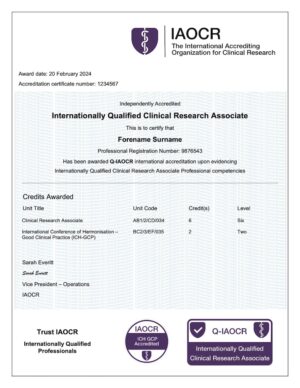The IAOCR has worked with clinical research professionals for over 10 years. If you are a life sciences graduate considering gaining entrance to the industry, we think you’ll get some valuable insights. We’ve written this blog to give you insight into the typical clinical research associate role, work life, daily responsibilities and skills required of the CRA.
CRAs play a pivotal role in developing new medical treatments and therapies. Their work ensures that clinical trials are conducted ethically, efficiently, and in compliance with regulatory standards.
Key responsibilities in the clinical research associate role
CRA job requirements are primarily centered around monitoring clinical trials to ensure they comply with protocols, regulatory requirements, and good clinical practice (GCP) guidelines. CRAs act as the main point of contact between the sponsor (usually a pharmaceutical or biotech company) and the clinical trial site.
The daily work life of a CRA requires exceptional organizational skills, time management, and adaptability. Each day presents a mix of tasks that range from site visits to meticulous data reviews and regulatory compliance checks. Here’s a closer look at the CRAs manage their multifaceted roles.
Prioritization and Planning
A typical day for a CRA includes much planning and preparation. This might involve scheduling site visits, setting up meetings with site staff, or reviewing upcoming project deadlines. Effective planning ensures that high-priority tasks are addressed promptly, reducing the risk of missed deadlines or compliance issues. CRAs assess potential sites to ensure they have the necessary resources and capabilities to conduct the trial. They will then train site staff on common clinical research associate job requirements such as study protocols, procedures and regulatory requirements.
Site visits and monitoring
Site visits are a crucial part of a CRA’s role. During these visits, CRAs monitor the progress of clinical trials and ensure compliance with the study protocol. CRAs often plan visits around key milestones in the trial to ensure their presence during critical phases.
Effective communication skills are essential, as CRAs need to interact with site staff, answer questions, and provide guidance. A site visit willusually include a team meeting with all the site staff to discuss how the trial is progressing, inform the team of any changes to the protocols and to generally answer questions. CRAs may also offer additional training to the site staff.
The CRA’s monitoring focus will particularly focus on the more complex protocols or frequent protocol deviations, which are high-risk areas. They document their findings in Monitoring Visit Reports (MVRs), highlighting any issues and recommending corrective actions.
Data Verification and Documentation
Documentation relating to the clinical trial must be kept in meticulous order. CRAs spend considerable time reviewing data to ensure it aligns with source documents. A robust process helps maintain data integrity and reliability. CRAs must balance this detailed work with other responsibilities, often setting aside dedicated time blocks for data review to ensure focus and accuracy.
CRAs adopt a risk-based monitoring (RBM) approach which adapts monitoring activities according to identified risks. They will focus on high-risk areas (e.g. very complex protocols and eligibility criteria or high numbers of Protocol Deviations) to ensure compliance and quality. Monitoring strategies are adapted based on ongoing risk assessments and findings. Some of the documentation includes:
Source Data Verification (SDV) – involves checking the data entered in the Case Report Forms (CRFs) against the source documents at the clinical site, such as (electronic) medical records, lab reports, and patient diaries.
Patient Consent Verification – involves checking that informed consent forms are properly signed and dated by both the patient and the investigator before any trial procedures are conducted.
Reporting and Follow-Up
After site visits, CRAs spend a significant amount of time documenting their findings and preparing detailed reports on the status of the trial, including any issues and resolutions. Here are a few of those reports:
Monitoring Visit Reports (MVRs) – documents the findings and activities from monitoring visits. Includes the date of the visit, site personnel met, patient recruitment status, protocol adherence, data verification findings, and any issues or actions required.
Financial reports – tracks the financial aspects of the clinical trial, monitor the budget, expenses, and payments to the sites, and ensure financial compliance and control.
In addition, there are interim monitoring visit reports, close-out visit resorts, adverse event reports, investigational product accountability reports and many more.
Training and Compliance
CRAs act as a liaison between the sponsor and the trial site. This involves giving regular updates to site staff, resolving issues, and providing ongoing training. They must ensure that the trial is conducted in compliance with all applicable regulations and guidelines.
Keeping abreast of changing regulations and guidelines is therefore crucial. CRAs often set aside time for continuous education and staying updated on industry standards. They also conduct regular audits and quality checks to ensure adherence to GCP (Good Clinical Practice) and other regulatory requirements.
CRAs balance their responsibilities through meticulous planning, effective prioritization, clear communication, and a flexible approach to managing the dynamic environment of clinical trials. This balance is essential to ensure the integrity and success of clinical research projects.










